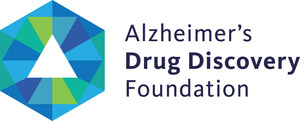While topline clinical trial results reported for gantenerumab are disappointing, we are in a new era of Alzheimer's drug development with incredible promise
NEW YORK, Nov. 14, 2022 /PRNewswire/ -- The Alzheimer's Drug Discovery Foundation (ADDF) remains incredibly enthusiastic about the current state of drug development for Alzheimer's despite the disappointing results reported today by Roche for their amyloid-clearing drug gantenerumab in the phase 3 Graduate clinical trials. According to Roche, gantenerumab did not reduce cognitive decline in a way that was statistically significant compared to placebo.
"While this is discouraging news for the many patients and families living with Alzheimer's, anti-amyloid therapies are just a starting point in new therapies for Alzheimer's patients," said Dr. Howard Fillit, Co-Founder and Chief Science Officer at the ADDF. "If you've seen one anti-amyloid therapy, then you've seen one anti-amyloid therapy. The results we've seen from drugs in this class point to the urgent need to bring a range of amyloid and non-amyloid therapies to market to slow the course of Alzheimer's disease."
According to Dr. Fillit, the drug pipeline is advancing a host of promising drugs that work against the many underlying causes of Alzheimer's that will allow for combination therapies and a personalized medicine approach based on each patient's unique needs. This is essential because Alzheimer's is a multi-factor disease driven by the biology of aging and, therefore, will require a multi-drug approach for the best treatment outcomes. According to a recent analysis of Alzheimer's clinical trials from the ADDF, more than three in four drugs in clinical trials today focus on non-amyloid targets.
On the heels of the positive results reported by Eisai and Biogen for their amyloid-clearing drug lecanemab, this is further proof not all drugs that attack the amyloid target are identical. The complexity of the aging brain means there are likely nuances in how drugs work to do things like clear amyloid and tau proteins, reduce inflammation, and improve the brain's metabolism. Each drug needs to be evaluated individually.
Drug combinations for Alzheimer's treatment mirror an approach that has been used successfully in other chronic diseases of aging, such as cancer and heart disease. Determining the best combination for each patient will be facilitated by easier-to-use and more accessible diagnostic biomarkers, which are coming to market in parallel with new drugs.
Roche will present additional gantenerumab data in November at the Clinical Trials on Alzheimer's Disease conference (CTAD) in San Francisco, where Eisai and Biogen are also slated to present lecanemab data. Eli Lilly is expected to share data on donanemab early next year. The conference will feature presentations on a broad range of diverse drug targets informed by the biology of aging as a driver of this new era of Alzheimer's research.
"Successes and disappointments are an expected part of the scientific process, but we are unmistakably in a modern era of Alzheimer's research, on the cusp of a new generation of therapies that will take a more holistic approach to treating the disease by targeting all of its underlying causes," said Dr. Fillit. "Years of relentless work by Alzheimer's researchers has built the foundation to conduct more rigorous trials, allowing us to measure the effectiveness of new drugs more efficiently."
The ADDF looks forward to learning more about gantenerumab and lecanemab at CTAD and eagerly awaits publication of data on both drugs in peer reviewed journals.
Founded in 1998 by Leonard A. and Ronald S. Lauder, the Alzheimer's Drug Discovery Foundation is dedicated to rapidly accelerating the discovery of drugs to prevent, treat and cure Alzheimer's disease. The ADDF is the only public charity solely focused on funding the development of drugs for Alzheimer's, employing a venture philanthropy model to support research in academia and the biotech industry. The ADDF's leadership and contributions to the field have played a pivotal role in bringing the first Alzheimer's PET scan (Amyvid™) and blood test (PrecivityAD™) to market, as well as fueling the current robust and diverse drug pipeline. Through the generosity of its donors, the ADDF has awarded more than $209 million to fund over 690 Alzheimer's drug discovery programs, biomarker programs and clinical trials in 19 countries. To learn more, please visit: http://www.alzdiscovery.org/.
SOURCE Alzheimer's Drug Discovery Foundation
WANT YOUR COMPANY'S NEWS FEATURED ON PRNEWSWIRE.COM?
Newsrooms &
Influencers
Digital Media
Outlets
Journalists
Opted In






Share this article